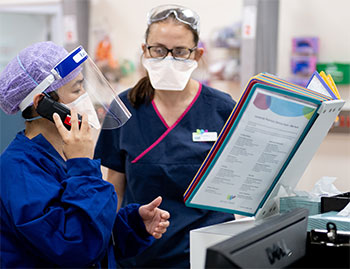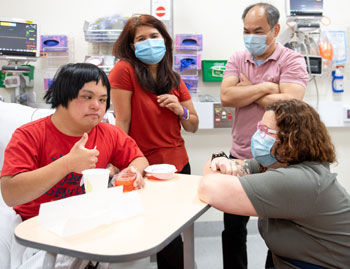Watching the television news has become a hazard for Stacey Reynolds.
Ever since early 2021, it’s been a rare bulletin that hasn’t featured the effort to vaccinate the world’s population against COVID-19. Footage of shiny needles puncturing bare arms has been on high rotation. It’s the stuff of Stacey’s nightmares.
“I’ve found it hard to watch TV with all the coverage, it’s just so graphic to me,” says Stacey, who works in advertising.
“Even the thought of a needle brings an instant rush over me”
If you think Stacey sounds like an anti-vaxxer, think again.
This 33-year-old professional spent months attempting to be vaccinated. Like the vast majority of Australians, Stacey wanted to protect herself and her loved ones.
But her extreme needle phobia – developed after a bad experience as a child – meant that she was left with nowhere to go.
Over many years, Stacey has sought help from medical doctors, psychologists and hypnotherapists to try to overcome her fears, and joined an international needle phobia support group.
Nothing has dulled the panic – nor the judgement from others.
“I know people find it hard to comprehend,” Stacey says.
“People can resonate with a fear of heights, but imagine if it were mandatory to skydive and throw yourself out of a plane at 14,000 feet? It’s the same feeling for me.”
As a result, Stacey has spent much of her life avoiding needles and medical procedures, even resigning herself to the fact that she’s unlikely to become a mother.
When the COVID-19 vaccine was mandated for workers, Stacey was scared – but determined.
She visited “quite a few GPs”, contacted day procedure clinics, and even presented to the emergency departments of two hospitals, asking if she could be anaesthetised for the vaccination process.
“Basically the response was ‘you’ll just have to suck it up, just face the wall (during the vaccination)’,” Stacey says.
The breakthrough came when Stacey was referred to Western Health’s Sedation Vaccination Clinic, which was set up by the West Metro COVID-19 Vaccination Program and Perioperative Services in October.
The clinic complements the efforts of the program’s mass vaccination hubs at Sunshine Hospital and Melton, as well as the various community pop-up sites run by the Outreach COVID-19 Vaccination Services. However, the Sedation Vaccination Clinic is very different as it reaches a small and vulnerable cohort of our community.
It is currently available, by referral and triage only, to people aged 12 years and older who have significant disability, behavioural issues, intellectual impairment, have experienced a major traumatic experience or severe needle phobia.
At any one session, a multidisciplinary team of up to ten clinicians works collaboratively to vaccinate up to five patients with the COVID-19 vaccine.
The team includes staff from the West Metro Vaccination Program, disability liaison services, anaesthetics and theatre teams.
“We’re really proud of this service,” says Suzie Ristevski, Operations Manager, West Metro COVID-19 Vaccination Program.
“It’s the most patient-centred approach to offering vaccination, and is the truest reflection of Best Care at Western Health, providing the right care to the right patient at the right time by the right people. It is very rewarding to see people who need extra support receive their COVID-19 vaccination, some of them waiting since March this year to have this done; their families are so grateful.”
On the day that Stacey had her first dose of the vaccination at Sunshine Hospital’s Sedation Vaccination Clinic, Aron, 16, was having his second.
Aron, who has Down syndrome and autism, was referred to the clinic by his doctor.
His mother, Arlene, says the family tried to several ways of helping Aron to feel comfortable with the vaccination process, including showing videos of his parents and siblings being vaccinated.
“But it’s very hard for him – he has sensory issues and a needle phobia,” says Arlene, who also works in disability support.
“We were very happy that we were able to get an appointment at this clinic.
“It went very smoothly and we wanted to celebrate at home afterwards because everyone in our family is vaccinated now.
“When we’re able to travel overseas again, we’re looking forward to going to see our family in the Philippines.”
Alex Potter, Western Health Operations Manager whose roles include managing the Disability Liaison Service, says the sedation clinic is an important part of a broader effort to support patients and community members with disabilities. So far, about 50 people have been vaccinated at the sedation clinic.
“Hospitals and health services have still got a lot of work to do to make services accessible for everyone,” Alex says.
“What we’re trying to do is provide an environment that’s supportive and accessible for everybody.”
For Stacey, this meant being sedated for both vaccine doses – three weeks apart – after she was assessed by an anaesthetist.
“I’m so used to people telling me ‘you’ve just got to get over it’, but for the first time in over 25 years, I had people here who listened to me,” she says.
Now fully vaccinated, Stacey has been able to return to work and she is once again planning outings with her family and friends.
“I’m just so relieved it’s been done,” she says.

| 
|
|
|
|
|
|
|
|
| 
| 
|
|
|
|
|
